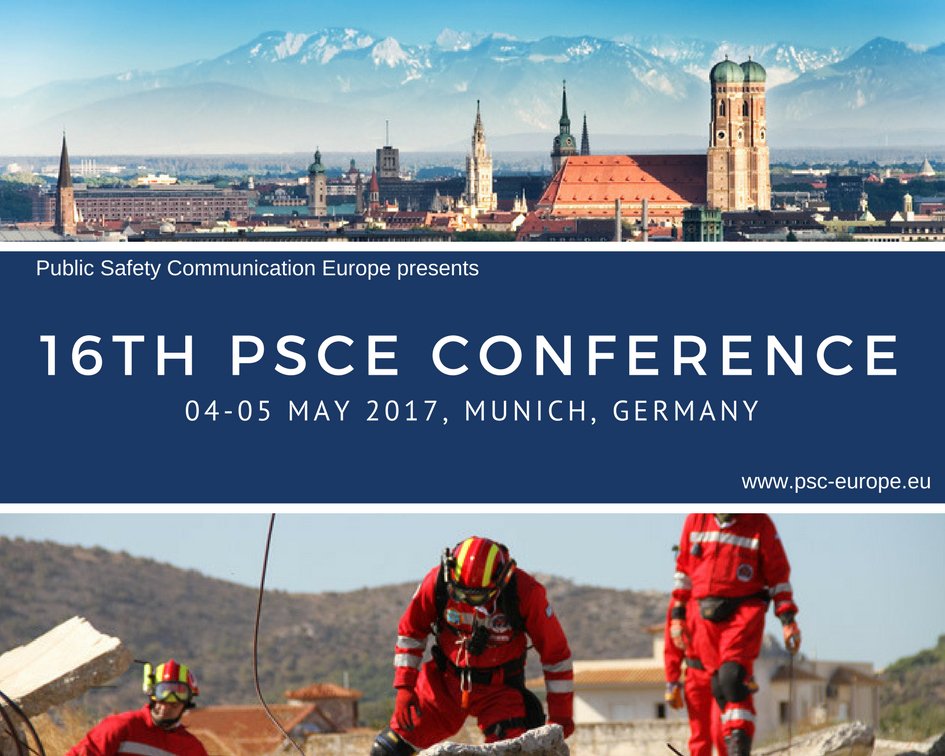List of PSCE Conferences
The full set of conference material, including presentations, lists of participants and reports, is available only for institutional members in the Library section. To access all restricted documents, institutional members must be logged in.
PSCE Online Conference January 2021
The PSCE Online conference took place on 19-20 January 2021. This edition focused on Cybersecurity, 5G, AI, Climate Emergency and Space Applications for PPDR.
Conference in Paris 2019
The second PSCE conference of 2019 took place on 3-5 December in Paris. This edition focused on the Use of Drones for PPDR, 5G, Artificial Intelligence and Space Systems and Applications for Public Safety and Security.
Conference in Lancaster 2019
The first PSCE conference of 2019 took place on 4-6 June in Lancaster. This edition focused on IoT for PPDR, Flash Flooding and Cybersecurity.
Conference in Bled 2018
The second PSCE conference of 2018 took place on 4-6 December in Bled. This edition focused on practitioners' training and education, Smart Communications and Wildfires.
Conference in Brussels 2018
The first PSCE conference of 2018 took place on 23-24 May in Brussels. This edition focused on the use of satellites in critical situations, 5G, an international perspective on future first responders and next generation control rooms.
Conference in Madrid 2017
The second 2017 PSCE Conference was held on 28-29 November in Madrid. The conference topics were an international perspective on broadband transition, the GDPR, the use of video in public safety and the internet of public safety things.
Conference in Munich 2017
The first 2017 PSCE Conference was held on 4-5 May in Munich. This edition focused on IoT applications for public safety, future broadband, on the ethical considerations embedded in the exchange of information in emergency situations, on cybersecurity, redundancy & resilience, the development of Apps in PPDR and on the use of UAVs (drones) in public safety missions.
Conference in Athens 2016
The second 2016 PSCE Conference was held on 22-24 November 2016 in Athens, Greece. The main conference focuses are Border security – control & surveillance; Natural disasters; Security by Telecommunications in transport.
Conference in Brussels 2016
The first 2016 PSCE Conference was held on 18-19 May in Brussels, Belgium. The main conference focuses were Emergency handling; Pan European Information space; Galileo, Copernicus and Crisis Management.
Conference in Oxford 2015
PSCE held its 2nd conference of 2015 on 9-10 December, hosted by Cyber Security Oxford at The University of Oxford. In parallel, PSCE also organised a Horizon2020 brokerage event on Dec. 8th.
Conference in Graz 2015
On 27- 28 May 2015 the Public Safety Communication Europe (PSCE) organised its biannual Conference in Graz, Austria. The overall purpose of the conference was to anticipate needs, determine latest trends and understand developments related to the future of public safety communication.
Conference in Gothenburg 2014
On 20-21 May 2014, PSCE its biannual conferences addressing the key topics within the domain of crisis communication. Co-organised by the Swedish Civil Contingencies Agency (MSB), the conference offered an interesting format, this time focused on interoperability, satellite communications, traffic security as well as on the management of the data flow in the control room.
Conference in Paris 2014
On 25-26 November 2014, PSCE organised its largest biannual conference in Paris, France. Co-organised and hosted by CISCO, the conference ofocused on public alert systems, critical infrastructures risk management, internet of everything and future communication networks.
Conference in Brussels 2013
On 28-29 May 2013, PSCE organised already its 7th biannual conference since its transformation from the FP6 project to an independent association in 2009. Held in Brussels, the conference was built up on 5 thematic pillars, each of them addressing unique aspects of public safety communication sector. Spread across two full days, conference participants had a chance to get acquainted with the latest developments in the field of EU Civil Protection Mechanism, E-Call, Radio Spectrum Policy, Horizon 2020 and Crisis Modelling domain.
Conference in Bucharest 2013
On 29-30 October 2013, PSCE held its conference in Bucharest, Romania. The event was a good opportunity to learn more about Shared Situation Awareness in Crisis & Disaster management; Airborne data acquisition and processing technologies for improved situational awareness ; Interoperability between different networks and Border control.
Conference in Rome 2012
On 28-29 November 2012, PSCE organised its conference in Rome, Italy. Hosted by the Istituto Superiore Antincendi (ISA - Fire Brigade Academy), the conference ocused on indoor localisation, security aspects related to the organisation of large events as well as on critical information infrastructure protection.
Conference in Helsinki 2012
On 30-31 May 2012 , PSCE organised its conference in Helsinki, Finland. The event was hosted by the Laurea University of Applied Sciences. The conference focused on Authorities' field command models; Convergence of critical governmental networks; User requirements for broadband; Social media and the adaptation of PPDR procedures.
Conference in Warsaw 2011
The conference in Warsaw was held on 30 November and 1 December 2011. The conference focused on Cyber security; Space applications in crisis management; Impact of Social networks in crisis management and Interoperability and solution networks for enhanced communication.
Conference in Brussels 2011
The first conference in 2011 was held on 7 and 8 June in Brussels, Belgium. The conference focused on Internal Security Strategy; Synergies between Defence and PPDR; Critical Infrastructure Information Protection; Radio Spectrum needs and Urban security.
Conference in Amsterdam 2010
The second conference in 2010 was held on 30 November and 1 December in Amsterdam, the Netherlands. The conference focused on Critical Infrastructure Protection and Public Warning Policy.
Conference in Vienna 2010
The first conference in 2010 was held on 16-17 June in Vienna, Austria. The conference focused on Civil Protection Structures and the New EU legal and organisational structures for Civil Protection.
Conference in Brussels 2009
The first PSCE Conference was held on 18-19 November 2009 in Brussels.The conference focused on the Needs of the users for public safety communication and Participation in EU funded projects.


























